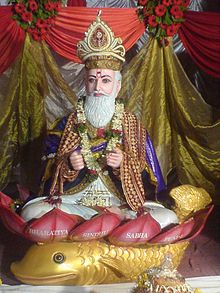| Total population | |
|---|---|
| c. 7 million | |
| Regions with significant populations | |
| 4,176,986[1][2][3] | |
| 2,772,264[a][4][5] | |
| Languages | |
| Sindhi Additionally Hindi–Urdu, and English | |
| Religion | |
| Related ethnic groups | |
| Punjabi Hindus, Gujarati Hindus, Rajasthani Hindus | |

Sindhi Hindus are Sindhis who follow Hinduism. They are spread across modern-day Sindh, Pakistan and India. After the partition of India in 1947, many Sindhi Hindus were among those who fled from Pakistan to the dominion of India, in what was a wholesale exchange of Hindu and Muslim populations in some areas. Some later emigrated from the Indian subcontinent and settled in other parts of the world.[6][7][8]
According to the 2017 census, there are 4.18 million Sindhi Hindus residing within the Sindh province of Pakistan with major population centers being Mirpur Khas Division and Hyderabad Division that combined account for more than 2 million of them.[3] Meanwhile, the 2011 census listed 2.77 million speakers of Sindhi in India, including speakers of Kutchi,[9] a number that does not include Sindhi Hindus who no longer speak the Sindhi language. The vast majority of Sindhi Hindus living in India belong to the Lohana jāti, which includes the sub-groups of Amil, Bhaiband and Sahiti.[10][11]
- ^ Centre for Land Warfare Studies https://archive.claws.in › roots-of-si... Roots of Sindhi-Hindu Exodus from Pakistan
- ^ "Hindu Population (PK) – Pakistan Hindu Council". Archived from the original on 15 March 2018.
- ^ a b "Table 9: Population by Religion, Sex and Rural/Urban" (PDF). Pakistan Bureau of Statistics. 2017.
- ^ Data on Language and Mother Tongue. "Census of India 2011" (PDF). p. 7.
- ^ "Scheduled Languages in descending order of speaker's strength – 2011" (PDF). Registrar General and Census Commissioner of India. 29 June 2018.
- ^ Rita Kothari, Burden of Refuge: Sindh, Gujarat, Partition, Orient Blackswan
- ^ Nil (4 June 2012). "Who orchestrated the exodus of Sindhi Hindus after Partition?". tribune.com.pk. The Express Tribune. Retrieved 29 January 2014.
- ^ Nandita bhavnani (2014). The making of exile: sindhi hindus and the partition of india. Tranquebar Press. ISBN 978-93-84030-33-9. Retrieved 12 September 2015.
- ^ Data on Language and Mother Tongue. "Census of India 2011" (PDF). p. 7.
- ^ Ramey, S. (27 October 2008). Hindu, Sufi, or Sikh: Contested Practices and Identifications of Sindhi Hindus in India and Beyond. Springer. ISBN 978-0-230-61622-6.
- ^ Schaflechner, Jürgen (2018). Hinglaj Devi: Identity, Change, and Solidification at a Hindu Temple in Pakistan. Oxford University Press. pp. 71–75.
Cite error: There are <ref group=lower-alpha> tags or {{efn}} templates on this page, but the references will not show without a {{reflist|group=lower-alpha}} template or {{notelist}} template (see the help page).
© MMXXIII Rich X Search. We shall prevail. All rights reserved. Rich X Search
